Workplace Romance 101: What Your Employees Need to Know Before Dating a Coworker

Whether it's February 14 or any other day of the year—love is in the air and on the clock.
According to a recent Forbes survey on workplace relationships, 43% of respondents married a current or former coworker, which means people are twice as likely to marry someone they meet at work than they are through a dating app! Who knew workplaces were giving match-making services such a run for their money?
The average full-timer spends more than a third of their waking hours at work, leaving little opportunity to meet people anywhere else. In fact, 61% of Forbes’ respondents cited “lack of time outside of work” as one of the main reasons office romances are so prevalent—another HR survey found that 81% of workers had dated a coworker at some point in their careers.
Despite a general decline in blanket “no fraternizing” policies, workplace romance is likely to feel taboo for most employees from the get-go. They may wonder if it’s a bad idea to date a coworker but feel hesitant to ask HR, let alone disclose if they’ve already started a relationship with a colleague.
To open the lines of communication with your employees and stay ahead of potential workplace dating issues, you need to establish clear guidelines, but what should your policy look like?
In this article, you’ll learn:
- How to make sure your employees are fully informed before mixing business with pleasure
- How to craft a workplace relationships policy and enforce it (policy example included)
- Signs of inappropriate workplace relationships
- Tips and insights from 20+ active HR personnel we interviewed from around the world*
*Editor's Note: Quotes have been lightly edited for clarity and concision.
The Importance of Having a Workplace Relationships Policy
For every workplace romance that ends in a happy union, there’s a cautionary tale that should give even the most lovestruck employee pause. And the consequences can cause major headaches for HR, including:
- Productivity loss
- Abuse-of-power scenarios
- Conflicts of interest
- Culture disruptions
- Sexual harassment allegations
Explicit workplace dating policies may be the best way to proactively protect your company and employees from heartbreak. Policies also give you and your employees something official to refer to when answering questions about dating in the workplace, including the most basic question of all: “Is it a bad idea to date a coworker in the first place?”
Free Download: Employee Dating Policy Example
Create a clear workplace dating policy for your company.
You don’t need to start from scratch. This template includes everything employees need to know before dating a coworker, including guidelines for disclosure and conduct, to protect your company culture and the safety of your workplace.
Dating a Coworker Is a Bad Idea, HR Pros Say, but Workplace Relationships Are Inevitable
No matter your personal opinions on the subject, no business can escape the for-better-or-worse inevitability of workplace romance. HR should be prepared to address it. Policy helps you do that proactively and generally and covers your bases as you take a case-by-case approach.
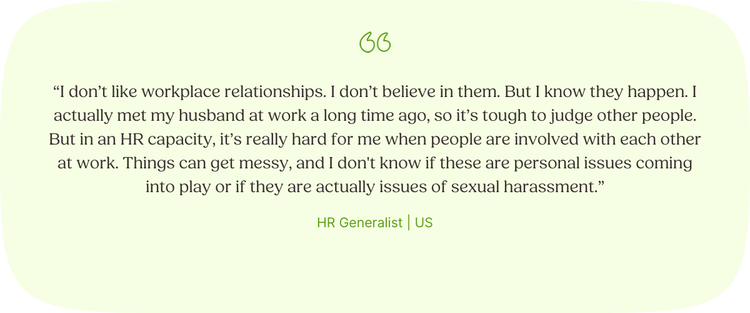
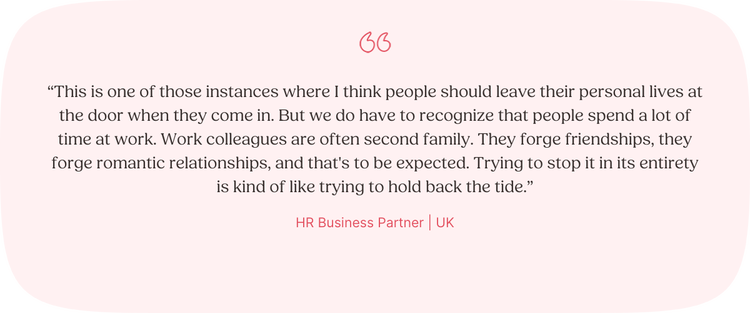


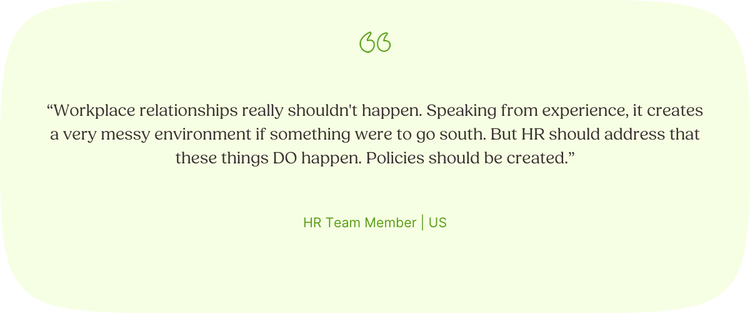
How to Craft a Workplace Dating Policy
Most workers (79%) who’ve pursued a workplace romance have dated their peers—but 10% have dated subordinates and 18% have dated a supervisor or manager. But even the barest of workplace dating policies often explicitly ban workplace relationships between managers and direct reports—as was the case with most of our interviewees’ policies.
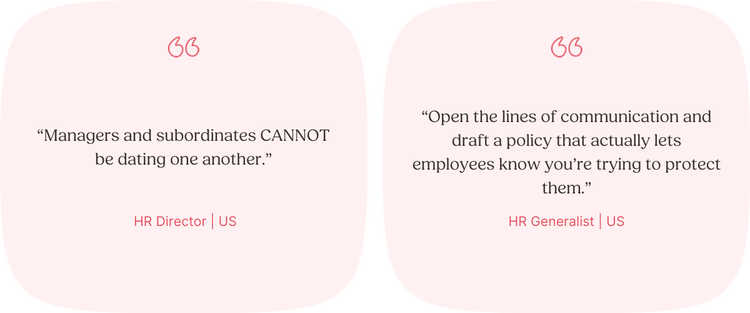
Beyond setting boundaries around managers and subordinates, a workplace dating policy that covers all your bases should also include:
1. Disclosure
Disclosure allows you to assess potential conflicts of interest and take appropriate action, usually moving couples out of the same department or working arrangements, adjusting schedules, or removing employees from power-imbalanced situations (i.e., an inappropriate boss-employee relationship).
A recent SHRM study found that only 18% of US employees disclosed their workplace relationship to their employer. To encourage disclosure, foster a culture of open communication and make the process of disclosure easy and nonthreatening. Specify that all relationships require disclosure the moment they turn romantic. Yes, even “situationships”—the latest trend in noncommittal romance, or a way to describe the pre-label period of a new relationship.
2. Consensual Relationships
Emphasize that all relationships must be consensual and free from any form of coercion or harassment. Encourage your employees to report any instance of non-consensual behavior promptly and outline clear processes for doing so.
Many of your employees may wonder if merely asking a coworker on a date is harassment. Your dating policy may summarize or link to your non-discrimination and anti-harassment policies to clarify when boundaries are being crossed.

3. Professional Conduct
Clearly define expectations for professional behavior in the workplace. This includes maintaining professionalism during work hours and on work premises, refraining from public displays of affection or behaviors that could make colleagues and clients uncomfortable, and avoiding conflicts of interest.
A couple of our interviewees felt that basic conduct policies should be enough to cover any issues that may arise from romantic relationships in the workplace and that a strict workplace dating policy would be a sign of HR overreach. Depending on your company culture, this may be the case. Consider getting input from your employee community to craft a policy that aligns with your culture and values.
4. Confidentiality
Stress the importance of maintaining confidentiality regarding personal relationships. Employees should never share sensitive information about their partners or colleagues with others.
A psychologically safe work environment is priceless—and profitable—and should be protected at all costs. It should be clear to employees that spreading colleagues’ private information is a serious violation that creates an unsafe, even toxic work environment for everyone and warrants disciplinary action.
5. Consequences
Outline the potential consequences for violating the workplace dating policy, which may include disciplinary action, reassignment, or termination, depending on the severity of the violation.
With that in mind, a common question your employees may hesitate to ask HR is, “Can you get fired for dating a coworker?” This may have been a consequence of strict “no fraternization” policies of the past, but in today’s workplace, it’s much more beneficial for HR to challenge past stigmas and cultivate trust. A generous open-door policy and a non-judgmental attitude will go a long way in persuading employees to bring issues to you early and openly, making your job easier in the long run.
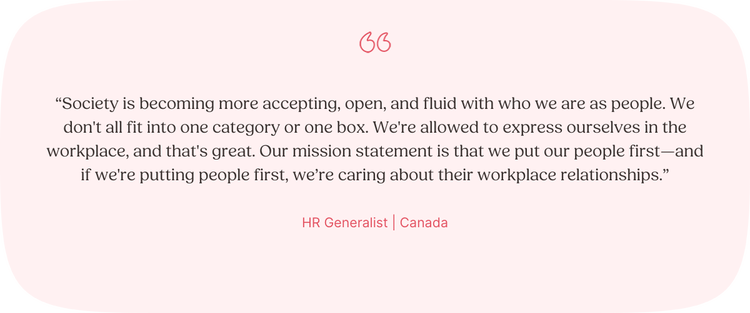
Signs of Inappropriate Work Relationships
Romances started in the workplace entail a 17% increase in break-up anxiety. While the stakes may be higher when career and romantic prospects intersect, another reason for this increased anxiety may be infidelity: of all those who've had a relationship in the workplace, an eye-brow-raising two in five (40%) were cheating on their current partner.
Luckily it’s not HR’s job to keep employees faithful in their relationships, but good policy can help mitigate general anxiety for employees by showing them how they’re protected under the policy.
For example, new or inexperienced employees may not be aware of the signs of inappropriate work relationships, and your company’s policy may be their first introduction to standards they have a right to expect throughout their career.
The most problematic dalliances may also be the least likely to be disclosed, so it’s important for HR to be aware of the signs as well. Signs of inappropriate work relationships to look out for include:
- Public displays of affection that a reasonable person would call inappropriate
- Non-consensual flirtation or advances
- Reports of favoritism or animosity between (ex) partners
- Sudden or inexplicable absenteeism or decline in performance
A few of our interviewees shared their experiences dealing with romantic relationships in the workplace. Here are a few stories that stood out, examples of how those situations were handled, and advice to HR on handling similar situations.
Emphasize Sexual Harassment Training for Supervisors
Managers and supervisors are responsible for upholding and directing company culture, so when they’re the ones crossing boundaries and fracturing employee trust, it’s important to act quickly.
“We had a supervisor who was trying to date a subordinate,” shares a US-based HR generalist. “And she was not interested. He didn’t understand that, even though she told him blatantly.”
The supervisor persisted, and the employee soon reported him for sexual harassment, providing HR with text messages and other information as evidence.
“We had to let him go,” says the HR rep. “He saw it as just asking somebody out, but the subordinate was very upset by it. That’s a very big deal. You can’t be doing that in the workplace.”
It’s important that employers take this aspect of the employee experience—psychological safety—very seriously. The rep suggests doubling down on sexual harassment training for supervisors: “Make sure they understand that no means no. And make sure they understand they should never be making a subordinate feel uncomfortable.”
Maintain Personal and Professional Boundaries
An HR manager in the UK shares a story about a married couple who worked as peers in the same area for many years. All was bliss until the relationship broke down and ended in divorce.
“One of the individual’s behavior became untenable in the workplace,” says the rep. They struggled to even be in the same room as their ex, so the line manager put them on different shifts, but it wasn’t enough.
“They were angry, rude, and stressed,” remembers the rep. “Just the presence of the other person kept setting them off, knowing they had been somewhere or done this or that.”
Eventually, HR had to take disciplinary action, and the employee resigned.
“What we learned from that was to make sure our policy was very clear,” shares the HR manager. “If there’s an impact on the workplace, we can pick that up under a relevant policy and follow procedure.”
Support People Managers Through Awkward Situations
Even when workplace relationships are going well, public displays of affection can land employees in hot water. A Canada-based HR generalist described an ongoing situation at one of the stores they’re responsible for.
“We’ve had concerns about two of our team members having displays of affection within the store. It’s making other team members uncomfortable.”
Following procedure, HR has left the initial conversation with the couple up to the store’s general manager, who'll reiterate expectations of professional conduct in the workplace.
“We always try and give the store’s general manager the opportunity to resolve issues themselves among the team,” says the HR rep. “And we empower them to do so.”
However, in the event that the couple's behavior remains an issue, HR would then intervene with a next-level conversation about repercussions.
“I’m hoping the issues have been resolved,” admits the rep. “That store is a bit difficult in terms of scheduling because it’s in a more remote location, and there’s only one store in that city. It’s not possible to have the two team members working at different locations, but we do try our best to put the two on different shifts.”
The situation highlights the importance of employees cooperating with policy as much as possible, and the awkwardness noncompliance creates for everyone involved.
Navigating Romantic Relationships in the Workplace
Attitudes around workplace romance are changing, but they’re conflicted: 75% of people say they’re not open to pursuing a workplace romance themselves, but the same percentage are comfortable with coworkers being involved with each other if they want to be. And while 83% say they respect or would respect colleagues in workplace relationships, 40% believe they’re ultimately unprofessional.
Remember our interviewee who married their coworker, yet doesn’t believe dating in the workplace should be allowed? Contradiction is as human as romance, and human resources professionals are tasked with navigating these gray areas with policy, best practice, and data as their compass.
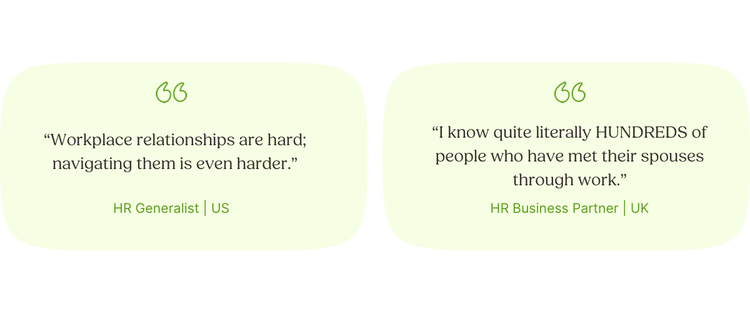
Tory points out that it’s inevitable for sparks to fly at work, and adds, “there should be a safe environment for team members to disclose their relationship status. We want to avoid perceived or explicit favoritism or conflicts of interests, and policy allows a company to proactively address concerns before they occur.”
To employees thinking of dating coworkers, Tory offers this straightforward advice: “Consider how this will impact your working environment. It may seem like a great idea when things are going well, but some relationships end badly. I encourage employees to think about what they'd do if this happens.”
In short, love may be a battlefield, but knowledge is power, and if your employees are educated about the proper ways to pursue a workplace romance, their employee experience (and livelihoods) will be protected alongside your company.
Get the Definitive Guide to Company Culture
Want a vibrant workplace that supports employees and helps your organization achieve its goals? Our guide offers a step-by-step plan for leveling up your company culture.